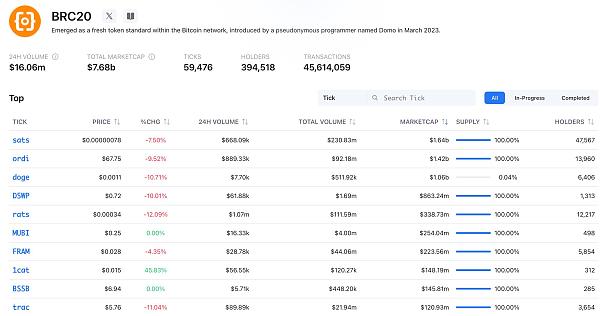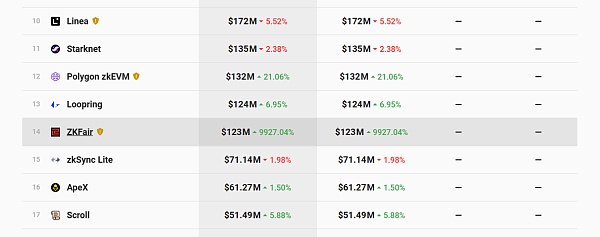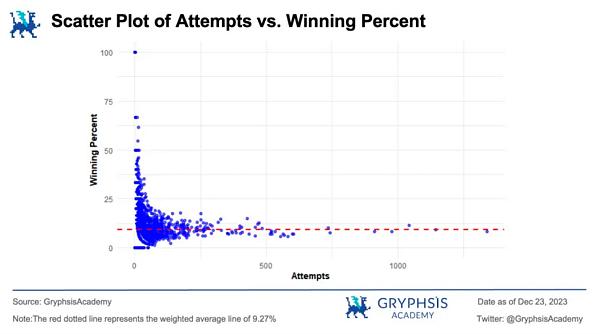Author: Xinwei, Ian
TL;DR
In the past few years, the blockchain industry has experienced tremendous changes, especially in the way tokens are issued. of innovation. From the initial simple ICO to the complex DeFi structure, to today’s Fair Launch and community-driven models, these changes have not only reshaped the landscape of asset allocation, but also triggered changes among market participants. extensive attention. Next, we will delve into several representative projects, each of which has demonstrated innovation and progress in this field through its unique token issuance method.
This article provides an in-depth analysis of several key projects, from Inscription's retail-driven model, to Blast 's incentive innovation, to ZKFair 's focus on fairness nature, to Analysoor’s innovation in distribution methods, to Binance’s use of Fair Mode to redefine the token economy, these projects not only demonstrate the diversity of the cryptocurrency ecosystem, but also reflect the market’s commitment to transparency and fairness Increased sexual needs.
MT Capital Investment Director Ian’s perspective: “We have witnessed in projects such as #BRC 20, #Blast, #ZERO, #ZKFair A great innovative way - fair distribution for everyone. They do not rely on platform coins or investors, and the earliest participants complete the investment, distribution, marketing and evangelism of the project. This is similar to DeFi Summer ; Liquidity mining in the project, the project's own liquidity incentives create prosperity for the entire chain. Fair distribution has greatly enhanced the enthusiasm of community participants, reaching unprecedented heights."
Inscription
The rise of Inscription is similar to the previous DeFi Summer, and its core lies in the concept of Fair Launch. This concept was very popular during the DeFi Summer period, and it mainly means that the project side does not retain any shares during the initial token distribution. For example, Andre Cronje, the founder of Yearn (YFI), claimed that he did not pre-mine, reserve tokens, or notify insiders in advance. This approach greatly enhanced his reputation and brought huge revenue to Yearn. ;TVL.
However, as DeFi Summer gradually comes to an end, the market has witnessed the emergence of more and more projects, and the entire cryptocurrency ecosystem has become more mature. During this period, capital began to enter the market, launching a project startup model driven by VC. Under this model, projects with large financing amounts and high reputation of investment institutions are more likely to attract market attention. This has also given rise to some users who mainly rely on "pulling hair" for survival and ordinary retail investors who are eager for airdrops of star projects.
In this context, the emergence of inscriptions has brought new changes. It is regarded by some as a "world of retail investors" because all chips are entirely cast by retail investors themselves. Although Inscription is viewed by some critics as merely having the attributes of a meme coin and lacking long-term practical application scenarios, it provides more opportunities for retail investors. As more and more Inscription projects are born and end the asset issuance stage, the Bitcoin ecosystem is expected to enter a new application construction stage.

https://geniidata.com/ordinals/index/brc20
Blast
Since its launch on November 21st, Blast has quickly become the focus of the cryptocurrency market, demonstrating its innovation and attraction in the Layer2 network field.
Blast is a Layer 2 network launched by Blur founder Pacman Based on Optimistic Rollups technology, Blast is compatible with Ethereum and provides developers and dApps with convenient access. The rapid growth of Blast's TVL and user numbers is quite eye-catching. Currently, Blast TVL has reached US$1 billion.
In addition, Blast has completed a $20 million financing round with participation from Paradigm and Standard Crypto
One of the main ways Blast attracts users and developers is through airdrops and incentive mechanisms. According to the plan, an airdrop will be held in May 2024 to reward early members and developers. Users can earn points by depositing assets and inviting new users to join the Blast L2 network. These points will directly affect the number of airdrops they receive. This mechanism incentivizes user participation and promotion.
Blast’s core appeal is its combination of staking mining and additional rewards. By depositing funds into Blast and using Lido to pledge on the Ethereum main network, users can not only obtain staking benefits, but also receive additional Blast rewards. The fundamental purpose of this strategy is to increase TVL and attract more users to participate in order to obtain additional Blast rewards. Blast's success relies on its innovative Layer 2 solutions and incentives that attract users and developers.

https://dune.com/0x ramen/blast-stats
ZKFair
ZKFair (ZKF) is an innovative Ethereum-based project focused on building a fair and community-driven second-layer network. As the first ZK-Rollup on Ethereum to utilize Polygon's CDK and Celestia's DA technology, ZKFair's core goal is to lower the current high barrier to entry for users in the second-layer network. In the current market environment, many ZK-L2 projects are led by VCs and have high valuations, and it is difficult for ordinary users to obtain substantial returns from them. These projects also encourage users to pay high transaction fees, but the distribution of token incentives is slow and not friendly to ordinary users.
ZKFair attempts to change this situation by creating a fair launch, community-driven network. Not only is this network technologically advanced, it's also powered by Lumoz RaaS. The project’s native token $ZKF follows a 100% fair launch approach, with no shares reserved for investors, pre-orders or early miners. All tokens are planned to be airdropped to the community after the mainnet is launched. The total supply is set at 10 billion, of which 7.5 billion will be used for gas fee airdrops and the remaining 2.5 billion will be used for community users.
What makes ZKFair compelling is its unique market positioning and distribution strategy. Market analysts are generally optimistic about its opening potential, and it is expected that it may achieve a value increase of 5-10 times. It uses the stablecoin USDC as Gas, combined with a low market capitalization and a novel chip distribution model, this project provides investors with an attractive story and a fair distribution mechanism. Regarding token acquisition, the rules state that addresses that have interacted with platforms such as zkSync, Scroll, ZKSpace, Polygon EVM, Linea, etc. within a specific period of time are eligible for airdrops. In addition, the project also stipulates the detailed process and restriction rules for burning Gas to obtain ZKF tokens, as well as strategies for how to quickly consume Gas by interacting with Dapps.

Analysoor
Analysoor is the first Meta Protocol on the Solana chain, introducing an innovative NFT and token Create and assign methods. At its core, it uses the block hash as a random number generator to select a winner per block, effectively neutralizing the influence of bots in the minting process of $ZERO and Index ONE NFTs.
Analysoor’s fair issuance mechanism focuses on fairness and liquidity orientation. There are no pre-sales, whitelists, team allocations, and no payment for first-mover transactions. GAS Fee. This means that every participant is on the same starting line, and differences in funding size will not affect the casting competition. Minting fees do not go to the project party or miners, but are used to increase liquidity and support the ecology and community.
Analysoor is building a strong community consensus, and its value and potential are being recognized by more and more people. Developers are also working hard to adopt more innovative methods to combat potential bot behavior and ensure the long-term maintenance of fairness, in which AI algorithms and machine learning will play an important role.
Compared to mainstream Launchpad projects on other public chains, Analysoor's current market value may be underestimated. Considering that there is no leading Launchpad protocol in the Solana ecosystem, Analysoor has the potential to fill this role and achieve huge value growth in the future.
The market demand for fairness and transparency is growing day by day, and the Fair Launch mechanism will become a trend. Especially on high-performance public chains such as Solana, 2024 may be the year Meta Protocol breaks out. As the pioneer of Fair Launch on the Solana chain, Analysoor has great potential and strong vision, and may expand into a multi-functional Launchpad in the future.

https://medium.com/@GryphsisAcademy/analysis-0-1-innovating-fair-launch-with-random-hash- 4a36ad6a0437
Fair Mode
Binance’s recently launched Launchpool mode “Fair Mode” represents an important innovation in the token economic system. The core of this model lies not only in the project itself, but also in the reimagining of the token economic system, aiming to promote the long-term healthy development of the project. Fair Mode has introduced a long-term development fund accounting for 27%. These tokens cannot be consumed or sold, and will not enter the market circulation, but are used for staking and participating in the ecosystem to support the continued growth of the project. In addition, the model fairly distributes up to 21% of tokens to retail investors out of 25% of its initial circulation, including Binance launchpool and airdrops, which not only increases the community’s influence in project decisions, but also inspires them to cooperate with project parties. willingness to cooperate.
By increasing the initial circulation and reducing the amount to be unlocked in the future, Fair Mode reduces the selling pressure in the market and lays the foundation for the long-term stability of the token value. At the same time, by reducing the token proportion of the team and investors, this model reduces their ability to manipulate the market and helps maintain the healthy value of the token. Binance has demonstrated its deep understanding of the industry by introducing Fair Mode, which may lead a new trend in the innovation of token economic systems. This model emphasizes the rationality and fairness of token distribution and is expected to become an important factor in promoting the development of the entire blockchain technology and token economy.

https://twitter.com/heyibinance/status/1737813180141666324
Summary
When summarizing this brief Insight , we can see the changes in the token issuance method in the blockchain field. Significant evolution and innovation. From the initial ICO to DeFi to today's fair issuance and community-driven models, these changes have not only redefined the way assets are distributed, but also attracted widespread attention from the market. Specific projects such as Inscription, Blast, ZKFair, Analysoor and Binance’s Fair Mode have continued to adopt the fair distribution model and have received good feedback from the market and major players. The successful attempts of these projects not only demonstrate the diversity and maturity of the cryptocurrency ecosystem, but also emphasize the importance of community participation and fair issuance in the future development of blockchain technology. As these innovations advance, the blockchain industry is expected to continue to play an important role in the global financial and technology sectors and open up new possibilities for future development.
 JinseFinance
JinseFinance










